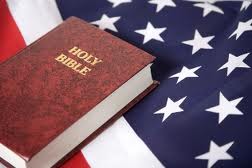Impatient prophets; a cranky Jesus; an apocalyptic Paul – that’s what Episcopalians have been encountering in the Bible lately if they are following the Daily Office lectionary this Advent season. This is hardly the stuff of holiday lights, cookie baking, or shopping malls.
The rhythms of the Christian liturgical year and their attendant biblical texts are supposed to interrupt “business-as-usual” and often quite rudely. Over the last couple of weeks those texts for this season have presented Isaiah’s denunciations of wealthy comfort, Jesus’ confrontations with self-satisfied religious leaders, and Paul’s urgent call to prepare for the coming “Day of the Lord.” I think that qualifies as “rude” two weeks before Christmas, at least in the United States.
 It’s especially rude here in the San Francisco Bay Area “bubble” where I live and work. Professionally, this bubble allows me teach theology and use the word “queer” positively without giving it a second thought. Personally, this bubble keeps me remarkably safe if I want to hold hands with another man in public.
It’s especially rude here in the San Francisco Bay Area “bubble” where I live and work. Professionally, this bubble allows me teach theology and use the word “queer” positively without giving it a second thought. Personally, this bubble keeps me remarkably safe if I want to hold hands with another man in public.
Life outside the bubble is a bit, well, different. I often say that wryly, even tongue-in-cheek. But something usually interrupts that smugness to remind me that my bubble-privilege comes with responsibilities.
Those reminders have been building, nearly tsunami-like on the horizon. They urge me to remember what the Santa-clad Starbucks cups and the roof-top Rudolph on my suburban block can so quickly obscure inside the Bubble: Advent prepares us to be changed by Christmas so that we can change the world.
Among the many ways Advent has been calling me to put my bubble-privilege to work, here are just a few:
- The “Kill the Gays” legislation in Uganda has been moving forward, and one of its primary proponents, Uganda Parliament Speaker Rebecca Kadaga, just received a blessing from the Pope at the Vatican. Kadaga, you may recall, rather famously promised the passage of this legislation as a “Christmas present” to Ugandan Christians. Let the record of ironic moments duly note this: The Ugandan delegation was in Rome, in part, to attend the World Parliamentary Conference on Human Rights.
- In the wake of the decision by the Supreme Court of the United States to hear not one but two marriage equality cases this term, Justice Antonin Scalia made some rather curious remarks at a gathering in Princeton. He tried to defend the legitimacy of legislation that relies on moral condemnations of homosexuality. More pointedly, Scalia wondered (rhetorically?) whether we can’t have any moral objections to murder if we can’t have moral objections to homosexuality. So I guess people who object morally to my dating another man should feel just fine about killing me as well.
- The distance between Uganda and Antonin Scalia shrinks considerably in the light of anti-LGBT violence. The number of “official” anti-gay murders in the U.S. in 2011 was the highest on record. The less-than-murder versions of anti-LGBT violence ought also to give us pause.
- While a gay-friendly Mosque where men and women can pray together held its first service recently in Paris (at an undisclosed location for security reasons), All Saints’ Episcopal Church in Pasadena has been the target of ugly emails and threats (from Christians!) just for hosting an Islamic group. Peace on Earth and good will to all? Hardly.
That’s just a short list of the people and places “lost in the valley of the night” and the hope of a “people who are climbing to the light.” Those are of course lyrics from Les Miserables, the film version of which opens on Christmas Day. That musical also includes a question perfectly suitable for Advent: “Beyond the barricades, is there a world you long to see?”
Substitute “bubble” for “barricades” and my Advent agenda quickly takes shape.
 Advent is about a new world, the world we long to see when we attend carefully to the visions of ancient prophets, the exhortations of Jesus, and the apocalyptic ranting of Paul. The birth Christians will celebrate in just eleven days evokes far less about the endearing qualities of a baby and much more about the new world God wants to midwife.
Advent is about a new world, the world we long to see when we attend carefully to the visions of ancient prophets, the exhortations of Jesus, and the apocalyptic ranting of Paul. The birth Christians will celebrate in just eleven days evokes far less about the endearing qualities of a baby and much more about the new world God wants to midwife.
I am profoundly grateful for the bubble in which I live and work. Advent urges me to tap that gratitude for a world-changing agenda. In Part Two of this post, I’ll outline just a few nodes of that agenda as we prepare to be changed at Christmas so that we can change the world.
























